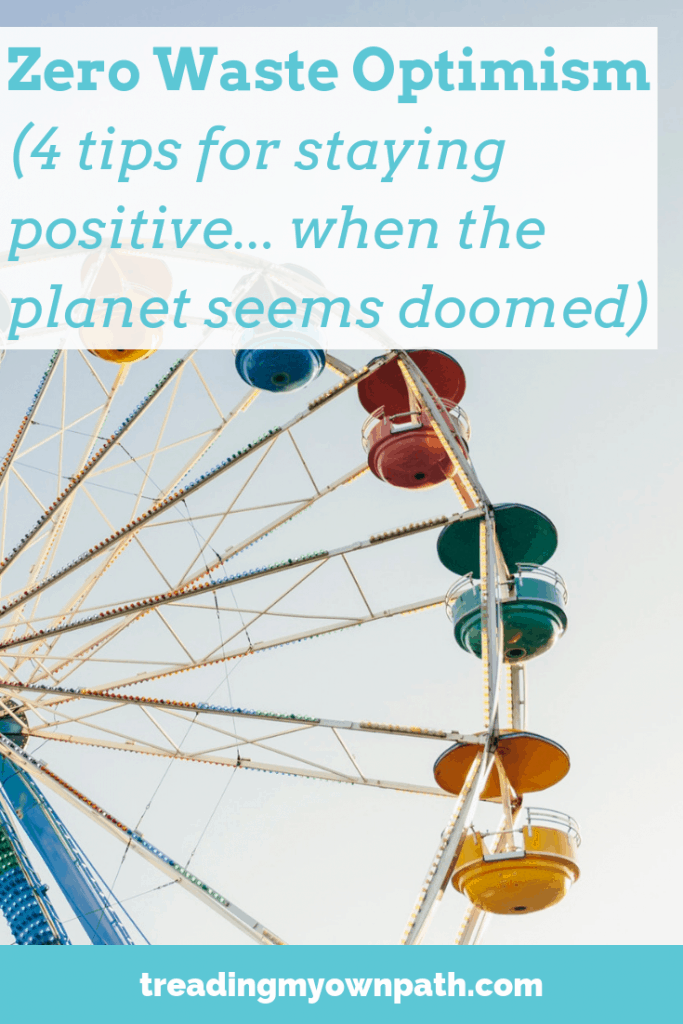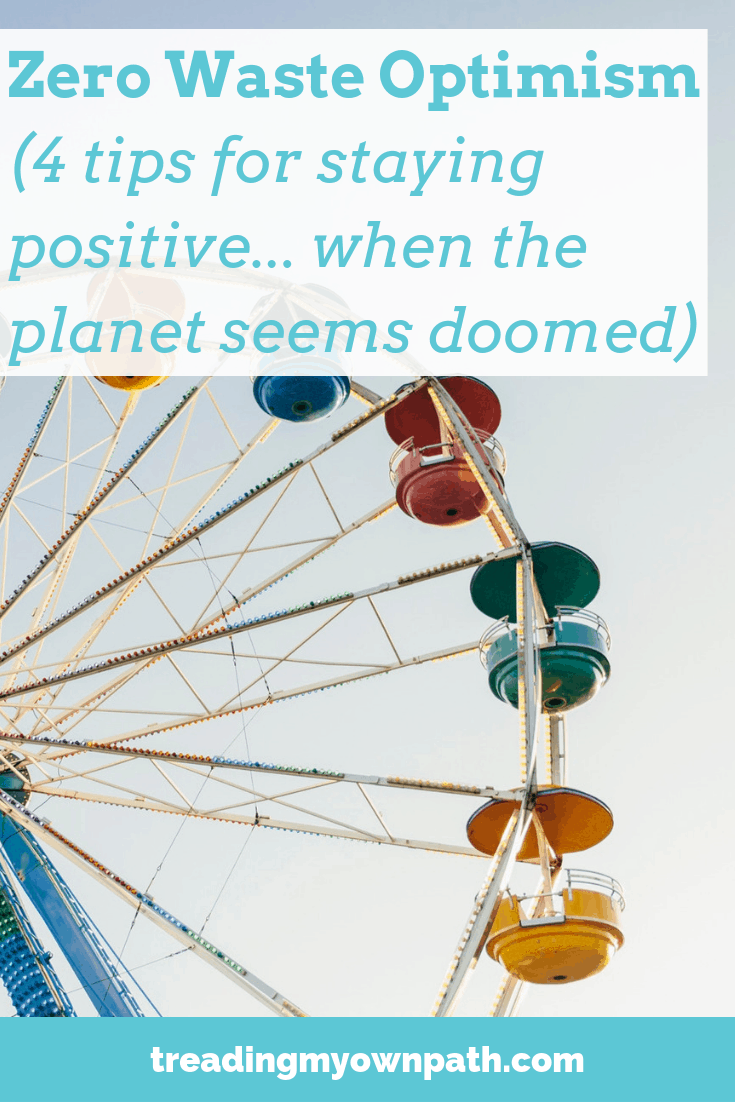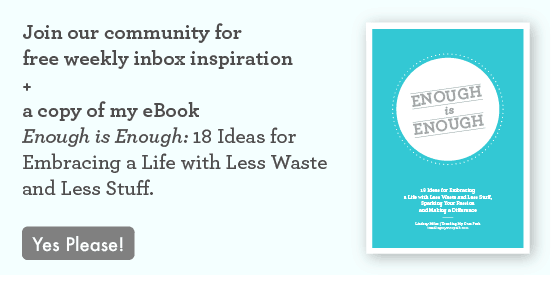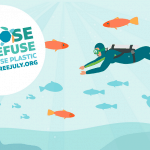Zero Waste Optimism (4 Tips for Staying Positive When The Planet Seems Doomed)
A question I’ve been asked a lot recently is “how do you stay positive?” It’s a fair question. After all, there are plenty of reasons we might despair. Pollution or litter or carbon emissions; the attitudes of governments and political leaders; or the lack of awareness, interest or action on the parts of businesses, organizations and even our friends and family.
Yes, it’s frustrating. Probably the most frustrating thing is not in seeing the problems, but in knowing that there are solutions and yet not seeing change being adopted on the scale it needs to be.
Despite this, I stay positive. That’s not to say I never have moments of doubt or despair, but on the whole, I’d say I’m an optimist. Here’s how I do it.

1. Optimism… or What?
I consider there to be three options. Optimism, indifference, or pessimism. Which translate as: we think that everything will be okay in the end, we simply don’t care, or we think that everything is doomed.
I’m not even sure that I consider this to be a choice. I do care: about the planet, about wildlife, about people, about fairness and equality and doing the right thing.
And if I do care, I can either think that everything will be okay, or that we’re doomed. I can either think that the planet is worth fighting for, that change is worth pursuing, that working towards making the world a better place is a goal worthy of my time and effort… or I can just give up.
And if I give up, if I turn my back on all the things that I care about: well, I don’t actually want to think about what that looks like. It’s not an option I want to entertain.
That’s not to say that I think I’m some kind of superhero or that the future of the planet is in my hands. I know I’m not the only one who cares, I’m not the only one trying to do what they can. It’s not to say that without me the planet is actually doomed (!).
But if there are two choices – one being we ‘win’, and start living sustainably on this one planet that we have – and the other being we ‘lose’, sea levels rise, the oceans fill with plastic and we make ourselves extinct – well, I know which team I want to be on.
Whatever happens, I need to be able to say, hand on heart, that I did something. Knowing that the only way to be on the winning team is to be a part of it keeps me optimistic.
2. Taking Action and Working on Projects
I find projects that get the message out into the community are the best way to keep myself motivated.
For the first six months that I went plastic-free I was very much focused on my own journey, learning skills and creating new habits for myself. After that, I was keen to figure out how to share my knowledge, get involved with the wider community… and I haven’t stopped since.
Over the next seven years, I started this blog and I started giving talks and running workshops. I got involved with my local council running a waste-free event, I worked on the Plastic Free July campaign. I co-started a community fruit tree project and community composting hub, and I set up a community dishes library.
None of these things are ground-breaking or world-changing, but they all contribute to bringing about change nonetheless. Connecting with others, sharing ideas, creating opportunity.
Even by sharing one blog post, or giving a talk to a handful of people, or starting a small project; you never know who you’re going to reach and what influence you’re going to have.
Ideas are like ripples and they spread. I share these things in the hope that others will adopt them, share them, make them better and together we will increase our impact.
Knowing that I’m contributing to something bigger than me and my personal waste or footprint helps keep me optimistic. And always having a project on the go, no matter how small, keeps my fire burning.

3. Remembering Where I Started
When it comes to staying positive, another thing that helps me is remembering where I started.
I’ve always considered myself to be someone who cared about the planet, but I know there was a time when:
- I asked for an extra plastic straw in my drink;
- I purchased fast fashion;
- I snaffled all the freebies regardless of whether I’d use them or not or how pointless they were or how much packaging they came wrapped in;
- I chucked every bit of food waste in the bin;
- I was in love with recycling (and saw that chasing arrows symbol on any packaging as a ‘get out of jail free’ card absolving me of any personal responsibility);
- I felt almost smug about the fact that I owned reusable shopping bags and only took a plastic bag when I needed something to line my bin.
(I’m sure there’s plenty more examples.)
I cared but I was totally disconnected to the impact my personal actions were having, and embarrassingly unaware that actually, my personal actions and my voice are exactly where my power comes from.
I thought it was up to others to change: governments, businesses, organisations. I didn’t realise that I have the power to influence, to champion, to hold to account, to share, and to take a better path every single day through the choices I make.
I believe that when you know better, you do better. If you don’t realise something is a problem, why would you do things differently?
I hold onto these memories of myself and know that if I can change, other people can change too. I like to believe the best of people, and I think that most people want to do the right thing. They just aren’t aware of the impact that their actions have, sometimes.
4. Looking back as well as forward
Lastly, I think it’s important not to focus on the task ahead so much that we forget to look back at what we have achieved and how far we have come. There’s been so much change in the last 7 years and when I think at how much perceptions have shifted, it feels incredibly humbling.
When I first took part in Plastic Free July in 2012, I was one of 400 participants. Last year 120 million people took part in 177 different countries.
Governments across the world are legislating to ban plastic bags, plastic cutlery, styrofoam, food waste to landfill and more.
Change is happening. I know that sometimes it doesn’t feel fast enough, but actually, it’s kind of incredible that we’ve done so much already.
When I think about how far we’ve come, I can only feel optimistic about what will happen in the future.
Now I’d love to hear from you! Do you consider yourself to be a pessimist or an optimist? What do you struggle with most? What tips do you have for staying positive? How has your outlook shifted over time? Anything else you’d like to add? Please share your thoughts below!








Hello Lyndsay,
You are an inspiration. Your blogs are an impromptu reminder to ‘follow the path”.
So many times I hear the phrase “the government should legislate the change”. Yes they should, but as you say, it is up to us as individuals to make the choice and try and influence and educate others.
I have plenty of money but now search the charity shops for interesting clothing simply because I believe in recycling. It was a necessity as a student as I had little money. All my redundant clothing is now recycled. It is also fun and the money goes to a good cause. However, there is a dilemma in that, if everybody bought second hand, the manufacturing industries would be in decline. We need the jobs. I believe part of the answer is ‘cradle to cradle’ manufacturing, where everything that is made is designed in such a way that all products can be disassembled into their component parts for reuse or recycling.
Thanks for all you do.
Martyn
Hi Martyn, thanks for taking the time to comment. I think sometimes we forget that governments only legislate change when they feel enough pressure to do so from shoppers, campaign groups, businesses, organizations and scientists – so we can add our voice to the issues we care about and try to bring these concerns to the top of the agenda.
As for your thoughts about second-hand clothing – well (sadly) we won’t see dramatic change overnight! If every single person purchased second-hand instead of new, then we might actually run out of second-hand things (…althoughsometimes I doubt it). I think the shift we need is in manufacturing things that are well-made, useful and solve problems. So manufacturing pointless plastic tat or clothes that wear out/become misshapen after one wash – we don’t need that kind of industry. But we will always need things. I think its a balance, and we are out of balance at the moment. If there was less second-hand stuff available and more responsible manufacturing, I think more of us would be happy to purchase new. We just went too far in one direction and it will take time to tip the balance back the other way. But if we are going to live sustainably on this planet, we have to!
This argument is the same as supporting the logging industry, because people work in it, or the coal industry, because people work in it, or whaling, because people work in it. Most cheap manufacturing plants use either robots or slave labour. We can do better. Maybe we need to think about how to ensure people are fed, housed, clothed and have meaning and connection in their lives. Industries will evolve over time. Are we worse off in Australia without whalers?
A Facebook post my daughter shared to me sums how I’ve been thinking about all this:
“Kelly Hayes
5 June at 08:01 ·
I’ve seen some posts and comments saying that if all of humanity is going to be extinct in 30 years (as some articles have suggested), why bother with justice work? Some people have said these things in jest, and I don’t begrudge anyone a bit of gallows humor. But some people have sounded a bit more serious, and to them I would say this: I would prefer to win, but struggle is about much more than winning. It always has been. And there is nothing revolutionary about fatalism. I suppose the question is, are you antifascist? Are you a revolutionary? Are you a defender of decency and life on Earth? Because no one who is any of those things has ever had the odds on their side. But you know what we do have? A meaningful existence on the edge of oblivion. And if the end really is only a few decades away, and no human intervention can stop it, then who do you want to be at the end of the world? And what will you say to the people you love, when time runs out? If it comes to that, I plan on being able to tell them I did everything I could, but I’m not resigning myself to anything and neither should you. Adapt, prepare, and take the damage done seriously, but never stop fighting. Václav Havel once said that “Hope is not the conviction that something will turn out well, but the certainty that something is worth doing no matter how it turns out.” I live in that certainty every day. Because while these death-making systems exist both outside and inside of us, so do our dreams, so long as we are fighting for them. And my dreams are worth fighting for. I bet yours are too.”
Hi Leanda, thanks so much for sharing this. So well put! There’s also that thought that yes, we might all be extinct in 30 years, but that is still a very long time to be alive, and why not make the best use of our lives and seek meaning from the things we do whilst we can? And there is nothing more intrinsically rewarding than learning new skills, connecting with people, helping others, sharing ideas, improving our local environment… Even if you told me, we won’t exist in 30 years, I wouldn’t do anything very differently.
I once read a statistic detailing steel imports to UK in WW2.
I cannot remember the figures but remember it went from a huge tonnage in 1939 down to 0 by 1945.
I always think of this when the plastic tsunami feels overwhelming.
To me it demonstrates that huge change can occur quickly when circumstances become extreme and change is mandated by government or other leadership, and embedded as the cultural norm.
Thanks for sharing Victoria – yes, humans are incredibly creative and resilient and organized when we need to be!
One way that I am trying to bring about change is making companies more aware of their part in reducing waste.
I aim to write at least one letter per week to food companies asking them to reduce and/or use sustainable packaging for their products.
If we don’t let them know we are unhappy with their product, they won’t feel the need to change.
I mostly get the same kind of replies. They say their company is committed to helping the environment yada yada but at least they know that their customers are concerned.
I would encourage everyone to write or email companies that have unecessary packaging, as well as not buying their products.
Hi Jayne, thanks for sharing and I totally agree with you. The thing to remember is that whilst your letter might not be the letter that creates change, it’s adding to the fire. If everyone that cared wrote a letter and expressed their concerns, and a company was receiving thousands of letters every week, they might decide it was time to act. We can be a part of this, and I think it is important to do this where we can.
That is excellent, Jayne! Keep it up. I wrote to the Newman’s Own company a while back because they’d switched to plastic jars for their pasta sauce. I told them that I would consider buying their products again if they switched back to glass and explained why. They replied with a somewhat stock answer. However, just a few weeks ago, I got another email from them saying they switched back to glass! Enough people reached out to them and they made the switch. Your voice matters!
there is an old-fashioned way of thinking about such things that i find useful: very simply, one can do the right thing because it is the right thing to do. without reward or support or praise, even if it is difficult or uncomfortable, in the face of opposition or even persecution, and yes, even without hope of the desired and needed outcome… and so, i will do what i feel is the right thing for the planet and all living beings whether it is convenient or certain of positive outcome or not.
however, i also feel that all of our actions in this direction ARE valuable. i choose to allow the possibility that we may transform ourselves enough to make a difference. i choose to make space for hope, remembering that we do not know everything.
as someone who has struggled with depression off and on for much of my life, i know the effects that despair can have upon positive action and belief. thankfully, after many years of yoga and meditation practice, i know how important and helpful it is to find tranquility within, to acknowledge that our feelings and beliefs may be erroneous and transitory, and to treat every day—every moment—as a chance to begin again.
it’s trite, but we need to practice self-care in order to be effective over time. all of your suggestions above are very helpful—they can restore perspective in times of despair, when sorrow narrows our vision. and we need to anchor our actions in love…love of each other, of all creatures, of this beautiful and fragile and yet resilient world. we are all connected, and our actions and changed mindsets may become resonant with each other, amplifying the effects and speeding up change. it’s not impossible…it only looks that way from our vantage point, perhaps.
if nothing else, i’d rather go into the darkness knowing that i did what is right.
Thanks for sharing your thoughts. Love this. Nothing more to add :)
Wonderful post! I recently moved into a new apartment and was shocked to discover that there is NO recycling! Perhaps I should have asked about this before I signed the lease, but it never crossed my mind (who doesn’t recycle?!). Now I have to figure out what to do what all the recyclables I’ve collected. I know it’s better to eliminate recycling altogether, but inevitably, there are still papers, cans, etc. that need to go somewhere. Where can I take them to be recycled? The place I lived in before is 4 hours away, so taking them back there isn’t an option. And then I started thinking, is it even worth it? The building I live in now has hundreds of tenants. If none of them recycle, does it even make a difference if I do? Is it worth all the extra effort? I’m still committed to finding a way to recycle, but I’m definitely feeling down about it. Really needed your tips today, so thank you!
You could make such an important difference in your building. Visit your neighbors with a petition, speak to the manager or committee or the council. Don’t give up without trying!
Hurrah for positivity, Som! :) Yes, lots of options. We look forward to hearing what happens!
Yes it does make a difference if you do! For all you know, half the other residents are making an effort already and the other half would if someone told them what the options were ;) Whereabouts have you moved to? I might have a resource I can share…
Even if you can just recycle some things and not all things, it is a start!
But also, geez that must be annoying! I totally feel your pain. Just start taking steps, you might not solve it all overnight but if you keep at it you will make progress :)
That’s very true! Thanks for the encouragement :) I’m in Indianapolis, IN.
You’ve pretty much summed up my lifelong relationship with optimism. A song from the musical South Pacific about a cockeyed optimists played on repeat in the background of my brain for decades, until one day when I realized I felt completely alone. Seemed as if nobody else cared about what we were doing to our planet. I think what finally saved me from simply dying inside was a random post in our neighborhood about a different kind of grocery store. There were a handful of people who also wanted local organic food, bulk items, etc., etc., all the good stuff. And a year later, with a plan in place, we set out to build a cooperatively owned market. But by the time we started building up steam in the community (an extremely conservative one at that), a pseudo farmers market chain moved in and interest in the co-op promptly waned, as did my hope for real change. Then my husband and I retired, passed down the family secondhand store to the next generation of salvagers, and I found myself with too much time to dwell on the underbelly of world affairs. And then my younger of two daughters at 34, and against all odds, got pregnant. I have a granddaughter due in November! Despite the fact I let both daughters know I feared for all the children born into the mess we’ve made, I’m overjoyed. And with renewed hope I found you and others who are making a difference, who see a better future, and my world is looking better every day. Thank you. Once again I’m stuck like a dope with a thing called hope, and I can’t get it out of my heart… not this heart!
Thanks for sharing Mary! I think you have a great story, and yes being optimistic does not mean we stay 100% positive for all of the time, life ebbs and flows and sometimes there are setbacks that are really frustrating. But hope is a great thing. Glad you got yours back, and congrats on your impending grandmotherhood!
I TRY to be an optimist, but often find myself defaulting back to a pessimist mindset, as i have been one most of my life
Trying is all you can do Daniel, and it is better than giving up! You can prepare for the worst whilst hoping for something better… :)
Hi Lindsay!
I’ve been following your blog for a few years now and I had to say *thank you so much* for this post! I have been so inspired by you over the years and have loved mulling over the ideas you’ve shared. I’ve started to notice that the deeper I get into actually thinking about the planet and caring about our collective impact on it (and all of the life dependent upon it), my mindset can get pretty bleak and things can start to look really scary! This was just the uplifting bit I needed to shake that off today! I just have to remember to breathe and trust that we will all pull through! Keep fighting the good fight! You are inspiring me to do better.
~Ky
Hi Lyndsay
Thanks so much for your gentle, inspirational reminders of what we can all do to help such a worthy cause! Being older means I grew up with vegie gardens, compost, paper bags, cooking from scratch, sewing skills etc but it’s so easy to get caught up in the convenience of a plastic way of life when under work and family demands :(
But I’m retired now, and as I remind my somewhat reluctant partner, we have time to resurrect those old skills of living more sustainably and how fortunate we are to have so much information available so easily.
Like yourself and David Attenborough I am optimistic and focused on what more I can do, especially as so many young people are now doing similar things to yourself and it’s so heartening.
Thanks for everything that you share…
Carole
Hi Lindsay! I was actively searching on eco-anxiety lately and how to cope with it when I came across your post. The timing was just perfect.
Loved a phrase you used – keep the fire burning.
I’d like to share a thought that keeps me going – “Whatever we do makes a difference, and we need to decide what kind of difference we want to make”